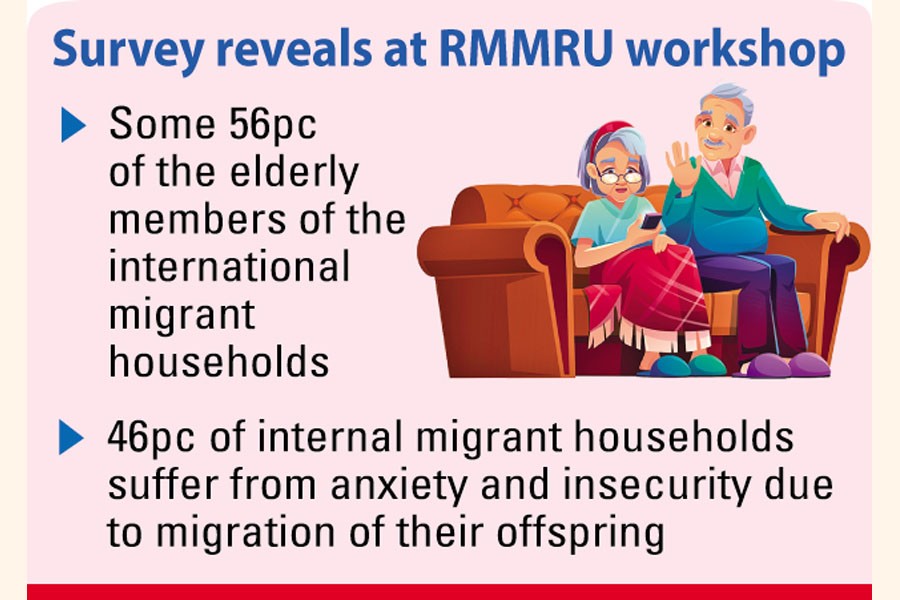
Published :
Updated :

The elderly family members of both domestic and international migrants suffer from anxiety, insecurity, loneliness and neglect as social cost of migration of their offspring, according to a survey.
The survey styled 'Social Cost of Migration on Left-behind Elderlies and Siblings' revealed on Sunday that the elderly members enjoy better food, housing, social status, medical treatment opportunity at the cost of sending off their sons and daughters away.
Findings of the study conducted by Refugee and Migratory Movements Research Unit (RMMRU) were published at a workshop at Brac Centre Inn in the city.
In 20 districts of Bangladesh, the study covered 6,000 interviews to examine the social cost and social gains experienced by elderly people and siblings.
The study conducted by Prof Tasneem Siddiqui and her team found both parents of migrants make major contributions--- in case of international migration 70 per cent of the parents contributed on an average Tk 3,47,000 to finance while one-fifth of the parents of internal migrants also contribute around Tk8,000 for migration of their children.
Parents also work as collateral for migration loan, the survey said.
According to the findings, some 56 per cent of the elderly members of the international migrant households and 46 per cent of internal migrant households suffer from anxiety and insecurity due to migration of their offspring.
Both types of parents experience loneliness and some also experience neglect, it said.
In the absence of migrant member, the survey found, 26 per cent international and 16 per cent internal migrant households take over the major task of rearing the child of the migrant.
Instead of receiving care, they become the care providers, the findings said.
The survey said more than 60 per cent of them enjoy better food, housing and social status while more than 70 per cent enjoy better medical treatment opportunity.
The survey said a majority of the left behind elderly people while facing the challenges also develop their own agency.
Being absorbed in work, social and political engagements, communication with migrant offspring through cell phones is some of the ways to adjust with the changed situation.
It said that 81 per cent of the parents of international migrants use mobile phone and 65 per cent use both mobile phone and IMO.
Around 12 per cent parents of international migrants and 7 per cent parents of internal migrants cannot cope with the absence of their children and they require external support, the survey found.
Contrary to popular perception, the study finds that left behind siblings also contribute in the migration project of the household.
One of the major social costs of migration on the siblings is disincentive to join work (in case of 7 per cent of international migrant households.
The survey found that 30 per cent of the siblings think their education suffered loss as they had to shoulder many household responsibilities in the absence of the migrant brother/sister.
Female siblings identified personal insecurity in the absence of their migrant sibling.
The survey said conflicts also arise among the siblings due to selling of property for financing migration of the migrant child.
On the other hand, the survey found siblings also experienced better quality education, medical treatment and employment generation, access to modern gadgets such as cell phone and televisions and higher social standing.
The study recommends that along with migrant children and spouses, parents and siblings also should be covered under the 2016 National Policy on Overseas Employment.
The study also recommended targeted services towards left-behind elderly members need to be planned under Wage Earners' Welfare Fund programmes and special care programmes can be designed for migrant families that have persons with disability and special needs.
Skills and enterprise development programmes can be designed particularly for the siblings, it said.
Bilateral and multilateral development partners should place the issue of annual leave for migrant workers to reduce many social problems i.e., feeling of isolation and loneliness, the survey recommended.
bdsmile@gmail.com


 For all latest news, follow The Financial Express Google News channel.
For all latest news, follow The Financial Express Google News channel.